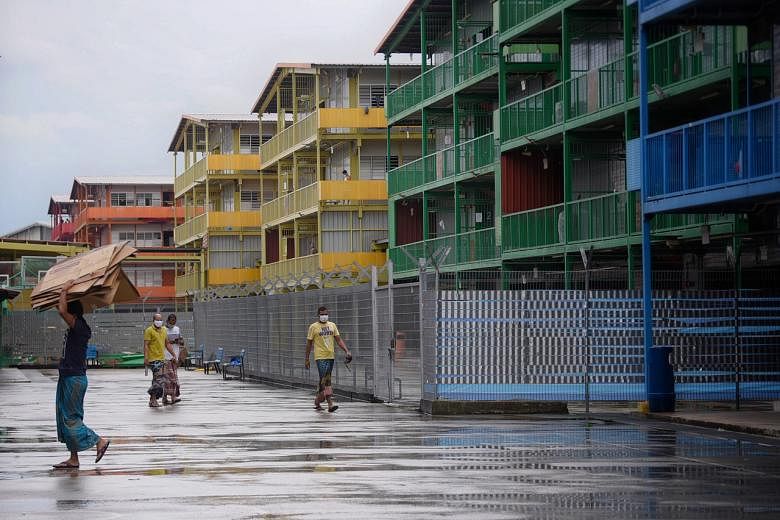The number of daily confirmed Covid-19 cases in dormitories is likely to fall below 100 in three to four weeks' time, Professor Teo Yik Ying, dean of the National University of Singapore's (NUS) Saw Swee Hock School of Public Health, said yesterday.
At the peak of the coronavirus outbreak on April 20, Singapore had a total of 1,426 new cases, of which 1,369 were migrant workers staying in dormitories. In contrast, yesterday saw 383 new cases, of which 381 were migrant workers staying in dormitories.
Prof Teo told The Straits Times that the drop was because measures to stem the spread of the virus in dormitories had been "broadly effective", pushing the basic reproduction number of the virus, or R0, to 0.5.
An R0 of one means each infected person will spread the disease to one other person every serial interval, which is the duration between successive cases of transmission.
Prof Teo said: "(An R0 of 0.5) means every five days or so, we'll halve the number of new reports... so if the measures in the dorms were indeed able to push down the R0 to 0.5, we'd expect the results to show up very clearly in about four weeks' time - about 28 days, or six serial intervals."
Yesterday, Singapore recorded its 14th day in a row when newly discharged Covid-19 cases outnumbered newly confirmed ones.
Prof Teo said this trend was not the result of a change in the criteria for discharge but because patients who had previously contributed to the surge in cases were now starting to recover as part of the natural progression of the disease.
Infectious diseases expert Leong Hoe Nam, who practises at Mount Elizabeth Novena Hospital, said: "The high number of discharged cases comes from patients who were due to be discharged. Those diagnosed around a month ago should be getting discharged now."
As for the relatively lower number of confirmed cases, Dr Leong said: "Many of those who were recently diagnosed would likely have been infected around a month ago. By now, it would be the fourth week of their illness - the period of time when around half of all patients start testing negative as they stop shedding the virus. Hence, the number of confirmed cases would fall."
But infectious diseases expert Paul Tambyah from NUS' Yong Loo Lin School of Medicine said lower case numbers may also be a result of fewer tests being done recently.
For the past two days, the Health Ministry said it had done fewer tests. This is believed to be because of the recent public holiday.
Prof Tambyah added: "We (also) know that more community recovery facilities have been set up and this would allow for the safe discharge of patients out of the hospitals and community isolation facilities... Either way, the reduced numbers are probably a welcome relief for our stretched healthcare facilities."
Prof Teo said the number of confirmed cases seems set to fall back to February levels, barring any unfortunate events.
He said: "Until we know the serial prevalence - the percentage of people here who have been exposed to the virus and may have antibodies that may confer temporary immunity - our understanding is the vast majority are still likely to be susceptible. So we still have to be very careful in minimising infections in the community.
"If you and I are susceptible and don't play our part, we've a high chance of being infected."













